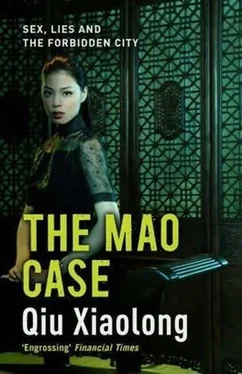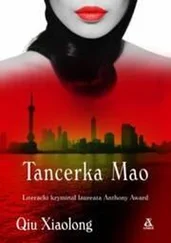There was another eatery open late at night and not too far away, but he had lost the mood. Instead, he plodded home, carrying the books.
Back home, he started reading on an empty stomach. In the distance, a siren pierced the night air. Absurd, he thought, turning a page. There’s no guaranteeing a rational account of human existence. Soon, he lost himself in the story – and the story between the lines.
About two hours later, he finished skimming through Cloud and Rain in Shanghai. Stretching his sore neck, he slumped on the sofa like the crushed fish in Shang’s death scene in the book.
The story was pretty much as he had anticipated. It was a tale of a beautiful woman’s suffering, which echoed an archetypal motif about a beauty’s “thin fate.” The writer was clever, focusing the narrative mainly on Qian, keeping Shang in the background. Like a traditional Chinese landscape painting, the book invited readers to see more in its blank spaces.
There was little about Jiao, though. When Qian passed away, Jiao was only two years old, and the structure of the book made her omission understandable.
Chen rose to pace about in the room. Lighting a cigarette, he thought he had a rough idea about Shang’s relationship with Mao, but no idea what Mao could have given Shang.
Another question presented itself. Could Mao have known about the special team from Beijing? After all, Shang wasn’t merely one of the “black artists.” Things could have been more complicated than Minister Huang had said.
So what was Chief Inspector Chen going to do?
It was an investigation he couldn’t refuse to do. Even so, he might try to conduct the investigation in a “rebellious” way, in his way – meaningful to himself, if not to others.
Like most people of his generation, Chen had not taken the Mao issue too seriously. As a child, he had worshipped Mao, but the Cultural Revolution shook his belief in the Chairman, particularly after the early death of Chen’s father. After that, things changed dramatically for Chen. Now, as one of the “successful elite” in present-day society, he tried to convince himself that he anchored himself with his faith in the Party. So he was in no position to think too much about Mao and he used his heavy workload as a chief inspector as an excuse not to do so. While the Party newspapers still paid lip service to Mao, a lot of things were different today in practice. So why bother?
Chen had heard stories about Mao’s private life. After the Cultural Revolution, Mao’s bodyguards and nurses had produced memoirs that turned Mao back into a human being somewhat by highlighting, for instance, his idiosyncratic passion for fatty pork or his unwholesome aversion to brushing his teeth. The books sold well, though possibly because of people’s interest in things behind those stories. But there were also other stories, not published but nonetheless circulated among the people. Since Mao’s archive was still locked up and considered top secret, Chen did not really believe or disbelieve those “other” stories.
Besides, Chen considered Mao too complex a historical figure for him to judge. After all, he wasn’t a historian, he was a cop, having to investigate one case after another. In recent years, however, he’d found it more and more difficult, even as a cop, to steer clear of the nation’s history under Mao. In China, a lot of things and a lot of cases had to be seen in a historical perspective, and Mao’s shadow still lingered there.
So it was the time for him to take on a case concerning Mao – the Mao case. If nothing else, the chief inspector might be able to gain a better historical perspective through the investigation.
And it could also keep him busy – preferably too busy to think about his personal crisis.
He sat back at the table, pulled up a piece of blank paper, jotted down the ideas that came to mind, and worked on combining them into a feasible plan. In the end, he decided to break his investigation into two parts. For the Jiao part, he would cooperate with Internal Security, but for the Mao part, he would go ahead on his own.
He was going to find out, first of all, what material or information could be used against Mao, and he would do this by going to the root – the relationship between Mao and Shang. Like the story behind the story in Cloud and Rain in Shanghai, it would be an investigation behind the investigation.
To begin with, he needed a comprehensive grasp of that period of history. An ideal scenario would be to contact the then special team from Beijing, but that was practically impossible. It had happened so long ago. And the people concerned would be put on alert as soon as he made the request.
Alternatively, he would contact the author of Cloud and Rain in Shanghai, who might not have included in the book all the information available regarding Shang’s death. In the meantime, he would also try to obtain a copy of the memoir by Mao’s personal doctor. In addition, he would try to secretly interview the people who were close to Qian and Shang.
Now, how could he possibly accomplish all this by himself? The clock ticked, almost imperceptibly. Chief Inspector Chen, unlike the character in a ridiculous fairy tale he had read, did not have three heads and six arms.
A glance at the clock told him that it was almost two in the morning. He would not be able to fall asleep, not anytime soon. So he took a couple of sleeping pills and swallowed them with cold water.
Lying in bed, he reopened Cloud and Rain in Shanghai, turning to the part about the first meeting between Mao and Shang at the China and Russia Palace of Friendship, where the melody rippled in the splendid ballroom, Shang’s steps soft as a cloud, light as the rain…
In about fifteen minutes he felt the pills gradually taking effect. As if surfacing from under waves of drowsiness, a fragment of a poem by Li Shangyin came to mind. Li happened to be Mao’s favorite Tang dynasty poet too.
Oh, last night’s star, last night’s wind, / west of the painted chamber, east of the cassia hall./ Lacking the soaring wings of a colorful phoenix, /our hearts speak through the magic rhinoceros horn…
CHEN WOKE UP WITH a fast-fading dream scene: a young woman in a red mandarin dress emerging out of nowhere, her footstep light as a summer rain of grateful tears, a fallen leaf caressing her bangled bare feet, a song coming on like a white cloud, like a light rain, but disappearing into a mural in the subway station…
Disoriented, he slowly managed to bring himself back to the first morning of the Mao Case – a case name he had made up the previous night.
However, his thoughts kept circling around the dream image. Possibly because of Ling, who had worn a similar dress in a different color, he recalled, rubbing his temples; or possibly because of Shang, who was wearing one in a black and white picture in the book, or possibly because of a serial murder case he had investigated not too long ago -
But dreams images are irrational, he thought, when another idea came to him, unexpectedly, like the lady in the red mandarin dress in the dream.
Swinging out of bed like a sleepwalker, he dialed a number from his address book.
“Sorry to call you so early in the morning, Mr. Shen.”
“Oh, Chief Inspector Chen. An old man wakes up early. I’ve been up for a couple of hours. What can I do for you?”
“Do you happen to know Xie, the owner of Xie Mansion on Shaoxing Road? You used to live quite close to that neighborhood, I remember.”
“Yes, I know him. Nowadays he’s an authority on the thirties, on the fashion of those years too. He talked to me about it two or three weeks ago.”
“Have you been to his parties?”
“No, I’m too old for those fashionable parties of his, but I went to his father’s. So he calls me uncle. That was before 1949, of course. What do you want with him, Chief Inspector Chen?”
Читать дальше












